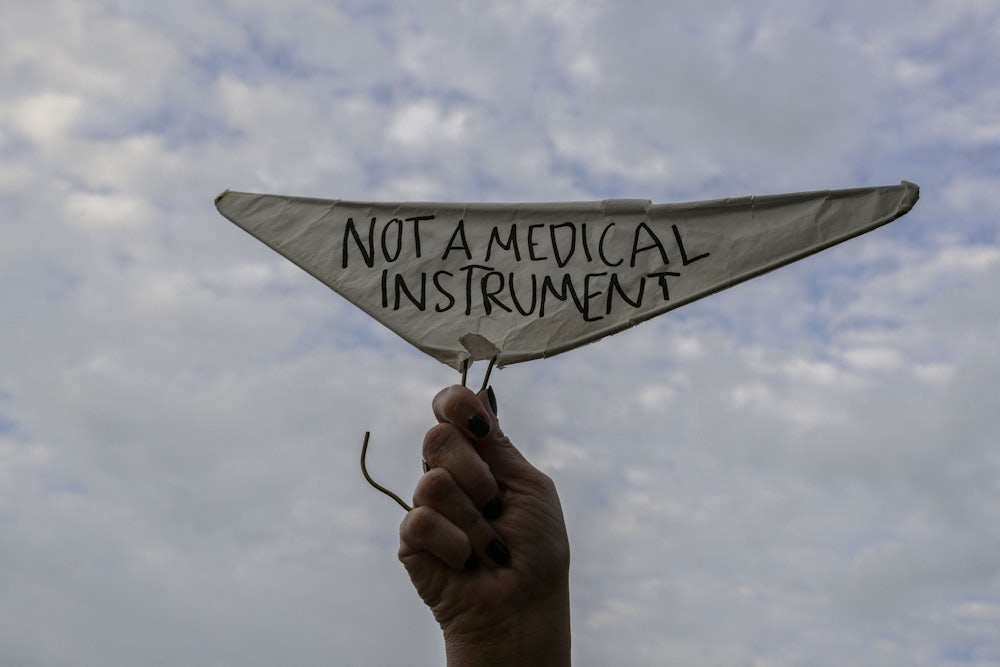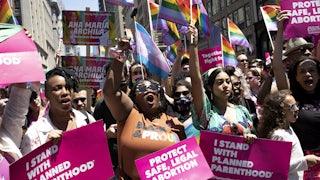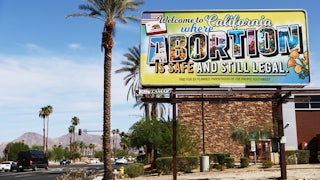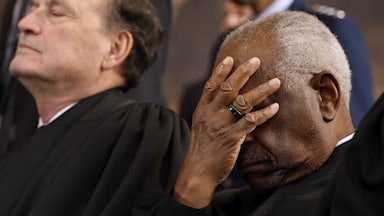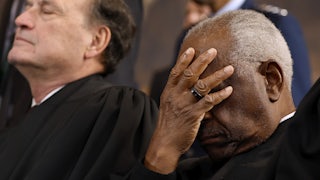Next week, Kansas voters will be the first in the nation to decide whether their state protects the right to abortion since the Supreme Court overturned Roe v. Wade in June. The ballot measure—which will be decided in the August 2 primary election—has seen considerable funding on both sides of the debate, but abortion rights activists are concerned that low turnout and confusing wording may mean abortion will soon be illegal in Kansas.
Billed as the “Value Them Both” amendment, it “would affirm there is no Kansas constitutional right to abortion or to require the government funding of abortion, and would reserve to the people of Kansas, through their elected state legislators, the right to pass laws to regulate abortion.” The question on the ballot risks confusion: A “no” vote would mean safeguarding abortion rights, and a “yes” vote could result in those rights being overturned.
“We have focused a lot on making sure voters understand that this amendment changes the Constitution and eliminates constitutional rights that we already have,” said Ashley All, the spokesperson for Kansans for Constitutional Freedom, which opposes the amendment.
Kansas is not exactly an oasis of abortion freedoms. Abortion is banned after 22 weeks and requires a 24-hour waiting period as well as an ultrasound ahead of procedures. Minors must receive parental consent before obtaining an abortion. Private insurance does not cover abortion, and public funds are unavailable for abortions except in cases of rape, incest, or to save the life of the pregnant person. But as many of its neighboring states have all but outlawed abortion, Kansas and its four remaining abortion clinics represent a safe harbor of access in a sea of restrictions.
“In the past, we used to think Kansas was a highly restrictive state, right? Now, when we look at the states around us [where] basically you cannot access abortion—like Oklahoma, Missouri, Texas, Arkansas—Kansas is looking pretty good right now,” said Sandy Brown, the president of the Kansas Abortion Fund, which helps provide abortion funding for Kansans with financial need. “We know that state-level laws always have an impact beyond state borders.”
“All men are possessed of equal and inalienable natural rights, among which are life, liberty, and the pursuit of happiness.”
So begins the first section of the Bill of Rights in the Kansas state Constitution, ratified shortly before the Civil War—lofty language that echoed Thomas Jefferson’s famous assertion in the Declaration of Independence. In 2019, the state Supreme Court ruled that this section protects the “right of personal autonomy,” which includes “the ability to control one’s own body, to assert bodily integrity, and to exercise self determination.”
“This right allows a woman to make her own decisions regarding her body, health, family formation, and family life—decisions that can include whether to continue a pregnancy. Although not absolute, this right is fundamental,” the judges ruled in the landmark 6–1 decision, asserting that abortion rights were protected by the state constitution and subjecting any law that might limit those rights to the standard of “strict scrutiny.”
The anti-abortion amendment on the ballot next week—pushed by the Republican-controlled legislature—would overturn the state Supreme Court’s ruling on abortion. Supporters of the amendment insist that the ballot measure would not immediately lead to an outright ban on abortion but reinforce the restrictions passed before the Kansas Supreme Court decision. “At this historically important time, the question before Kansans on August 2nd is clear: an unregulated abortion industry with no limits at all or the reasonable limits protected by the Value Them Both Amendment,” said Mackenzie Haddix, the deputy communications director for Value Them Both, a coalition that supports the amendment, in a statement after the U.S. Supreme Court’s decision overturning Roe.
Of course, abortion is already restricted in Kansas, and there have been no postviability—i.e., late-term—abortions since 2018. In 2021, around 70 percent of abortions in Kansas occurred before nine weeks, and 90 percent before 12 weeks. Although the court’s 2019 ruling struck down a state law banning a kind of second-trimester abortion, it did not automatically overturn existing laws limiting abortion; those would have to be challenged in court. If the amendment next week passes, it is likely that Republicans in Kansas will take action.
“I think as soon as feasible, the Kansas legislature will pass some kind of an abortion ban,” said Richard Levy, a professor of constitutional law at the University of Kansas. He noted that the amendment says the legislature “may” take into account considerations of rape, incest, or saving the life of the mother when crafting abortion restrictions—but it does not have to do so. “There’s nothing in the amendment that would prevent the legislature from adopting a ban from the point of fertilization onward with no exception under any circumstances,” Levy said.
Earlier this month, the Kansas Reflector reported that a regional director for Value Them Both told an audience of Republicans that they were prepared with legislation to ban abortion if voters pass the amendment, referencing a proposed bill that would criminalize all abortion from the moment of fertilization. The legislation would not make exceptions for rape, incest, or the life of the pregnant person, and it would be a felony charge on the same level as murder. (Haddix told the Reflector that the person no longer worked for the coalition and did not represent the organization.)
There are also concerns about the timing of the vote, which will occur on the August 2 primary instead of on November 8, the day of the general election. Primary elections typically have lower turnout, driven by motivated partisans. In the 2018 midterm elections, only 27 percent of registered Kansas voters turned out in the primary, compared to 56 percent in the general election.
“Passing an amendment like this on the basis of what amounts to a small majority of 20 percent of the vote is not a good way to deal with this, as a matter of democratic legitimacy,” said Levy.
Moreover, independent voters are not permitted to vote in party primaries, meaning that those voters will have no reason to turn out for the primary election except to vote on the amendment. As of July 2022, there are more than 560,000 unaffiliated voters in Kansas—a lesser proportion of registered voters than the number of Republicans, but more than the number of registered Democrats in the state.
“It has been absolutely an additional obstacle for us. In addition to having to explain the ballot language, which is extremely confusing, we also have to do a lot of outreach just to make sure people know that the vote is happening in August,” All said about the campaign to educate unaffiliated voters.
But it’s possible that holding the vote in August rather than November could backfire for supporters of the amendment, as the U.S. Supreme Court’s decision overturning Roe is still fresh and could motivate greater turnout among voters who might otherwise be discouraged from going to the polls. All said that the week before the decision was released, Kansans for Constitutional Freedom had around 50 volunteers canvassing in several metropolitan areas; since the decision, the coalition has averaged around 500 volunteers.
Of course, anti-abortion activists may be particularly motivated as well, seeing the opportunity for the legislature to pass greater restrictions without being impeded by Roe. The Washington Post reported that Value Them Both and other anti-abortion activists have knocked on more than 100,000 doors.
According to the ad-tracking firm AdImpact, Kansans for Constitutional Freedom have spent $4.5 million on ads through July, and Value Them Both had spent $3.9 million. NBC News reported that Kansans for Constitutional Freedom had raised $6.5 million to Value Them Both’s $4.7 million between January 1 and July 18.
“There’s a lot of yard signs,” Brown quipped.
There has been limited polling on the amendment, but what little there is indicates a close race. According to a poll conducted by co/efficient and first reported by FiveThirtyEight, 47 percent of likely primary voters said they plan to vote for the amendment, while 43 percent said they plan to vote against it. Eighty-four percent said that the amendment increased the importance of voting in the upcoming election, including 86 percent of independents.
If the amendment is passed, the future of abortion rights in the state is uncertain. It is unclear whether the Kansas legislature would include exceptions for rape, incest, and the life of the pregnant person in an abortion ban or if it would follow the lead of neighboring states like Oklahoma and Missouri and only allow abortions in cases of life endangerment. However, even in states with nominal exceptions, there have already been reports of women and gender minorities with life-threatening conditions struggling to obtain care, and experts say that such bans could complicate treatment for miscarriages and ectopic pregnancies.
Levy said some jurisdictions could prosecute abortion providers for murder under a 2013 statute saying that life begins at fertilization. “The definition of murder is the killing of a human being. So the only thing that is preventing that sort of a murder prosecution is constitutional protections for abortion rights.”
It’s possible that there could be challenges to the amendment brought to the state Supreme Court based on its potentially misleading language or the impropriety of holding such an important vote on a primary day, but Levy characterized both of these possibilities as long shots. If an abortion restriction violates another right enumerated in the state constitution, it could involve a challenge brought before the state Supreme Court.
Kansans for Constitutional Freedom’s All said that if the amendment is passed, advocates will press to hold lawmakers accountable and ensure that a ban without exceptions is not enacted. “The other side has very much, I think, tried to moderate their message and say that this isn’t about a ban. Well, if this ends up passing, then we need to make sure we hold them to that as best we can. And that requires advocacy; it requires people continuing to be engaged,” she said.
Brown said that the Kansas Abortion Fund would continue to help fund abortions for Kansas residents; the organization already helps pay for abortions that Kansans obtain out of state, and would still do so even if abortions were banned. The fund will also be partnering with the organization Just the Pill, Brown said, which has a mobile abortion clinic in neighboring Colorado.
“We’re on the precipice of knowing whether … people will be driving through Kansas trying to get to Colorado, or whether they’ll be coming here to Kansas in the future,” Brown said.
